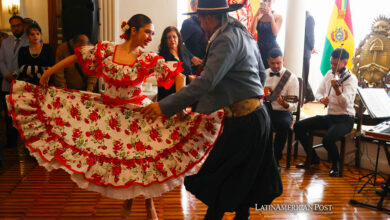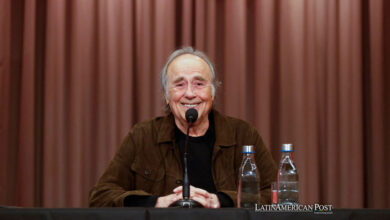25 Years of Harry Potter in Spanish: How has the World Changed?
Earlier this week, we marked the 25th anniversary of "Harry Potter and the Philosopher's Stone" publication in Spanish. We tell you how the world has changed after 25 years of Harry Potter.

Photo: Warner Bros. Pictures
LatinAmerican Post | Staff
Listen to this article
Leer en español: 25 años de Harry Potter en español: ¿Cómo ha cambiado el mundo?
In 1997, the British JK Rowling, about 32 years old at the time, made her debut as a writer with the publication of the novel "Harry Potter and the Philosopher's Stone." The success of this adventure novel in which a child enters a world of magic was immediate. So the following year, the book was translated into Spanish. That is why today the Hispanic world celebrates the 25th anniversary of Harry Potter.
Many events have happened since then, not only in Harry's world but also in ours, that of his readers. Not only did this novel inaugurate what would become a saga and later a film franchise, but the world has changed to such an extent that its author has been hated and adored in equal measure. This is how the world has changed after 25 years of Harry Potter.
The Literary and Film Saga
The novel quickly began to win awards for children's and young adult literature. The first printing of "Harry Potter and the Philosopher's Stone," of 1,000 copies, sold out very quickly, and its value skyrocketed. By the following year, the author, a disciplined writer, had the manuscript for the sequel ready. "Harry Potter and the Chamber of Secrets. And in 1999, at the same time that "Harry Potter and the Prisoner of Azkaban" was published, the production company Warner. Bros. acquired the rights to adapt the series to film.
he adaptation of that first novel was released in 2001, between the publication of the fourth and fifth books. So J. K. Rowling had to write almost half of the Harry story at the same time as the first books were being adapted. What had begun as an idea for a novel about a magical school had become a film franchise by the first decade of this century.
In 2008, J. K. Rowling published the novel that ended the Harry Potter story. In 2011, the adaptation of this last novel, "Harry Potter and the Deathly Hallows Part II," was released.
After 25 years of Harry Potter, Rowling is the world's most widely read living author and the most widely read female writer in history. The publishing phenomenon gave way to the box office phenomenon. It inaugurated a phenomenon now repeated by other producers with literary sagas such as "The Hunger Games" or television producers such as HBO with "Games of Thrones." Thus, Harry Potter pioneered the literary, cinematographic, and television phenomena that are the bread and butter of today's audiences.
Harry Potter: A Trademark
By the end of the last century, when Warner Bros. acquired the rights to adapt Harry's World, the film industry knew that the royalties from a literary world would not be seen only at the box office. Such was the case with "Star Wars" (1977), with which the industry understood and saw the potential of the thematic merchandise. Harry Potter, then, would be no exception.
As expected, the movies surpassed even (though not by much) the success of the books. Seeing the fantastic world of Harry Potter and his friends on screen was an experience not only for loyal readers of the saga but also for those who did not know it.
That's how Harry Potter became a brand. It was no longer enough to see this universe on the screen, but Warner wanted to make it possible for readers to enter it. With this idea in mind, the production company announced in 2007, a year before the publication of the last novel, the construction of "The Wizarding World of Harry Potter," a theme park in Orlando, Florida, with attractions, stores, and restaurants. After its opening in 2014, two other parks were opened: one in Osaka, Japan, and another in Los Angeles, California.
After 25 years of Harry Potter, the franchise released as many as 17 video games for different consoles and bright devices, the most recent was released just last year, "Hogwarts Legacy".
Read also: "Hogwarts Legacy", The Video Game that Seeks to Transgress the Legacy of "Harry Potter"
Spin-Offs: The Story Continues and is Rewritten
And despite all this, Harry's story branched out in various ways. It is not that we know more about the protagonist of this world, but we can peek into his class notes, for example, with the other publications of its author, which are no longer narrative texts but descriptive of Harry's world. Perhaps the most famous today, as it is one of those that Warner is still adapting for the cinema, is "Fantastic Beasts and Where to Find Them," a textbook read by Hogwarts students.
In addition, the author has written other manuals that give us a glimpse into this world, such as "Quidditch Through the Ages," a manual of the most popular sport among wizards, and "The Tales of Beedle the Bard," which are fairy tales of the magical world. The cinema, of course, has drunk and will continue to drink from these publications annexed to Harry's world.
This year, HBO announced the production of a series, which will start again with the first novel. It will be an adaptation now for the television format that, we can suspect, will be an update of the story.
J. K. Rowling: Loved and Hated Author
But why should the most successful teen saga of this century be updated? There is no need for some, as the story is as relevant now as it was 25 years ago. However, for others, among whom we can count some fans of the magical world, Harry Potter should be separated from its author.
A couple of years ago, J.K. Rowling, who early in her career was suggested to use a neutral pseudonym so as not to scare off readers, tweeted that she was annoyed by the widespread use of the term "menstruating people" instead of the word "women." This upset many of her fans (who would now claim to be Harry Potter fans rather than hers), as it goes against the language that some queer activism advocates.
Over time, Rowling has made more statements and confirmed her position. Thus, some years ago, the author was "canceled" by some avid readers of her novels since, they argue, Rowling's statements and tweets go against the diversity of the world created by herself.
One thing is sure: Neither the cancellation by queer activism nor the author's positions will prevent the franchise from continuing to exist, be commercially successful, and be culturally influential. We'll be seeing more of the Harry Potter universe soon.





